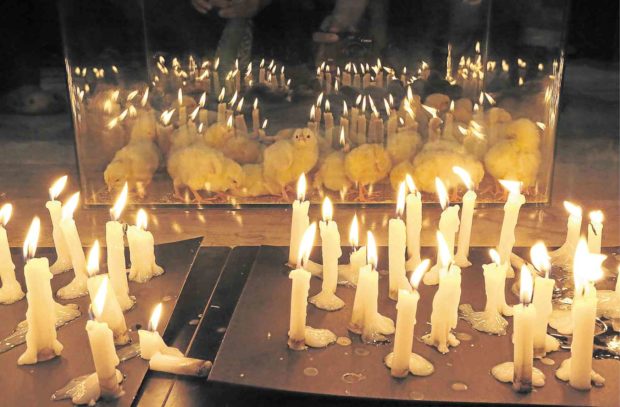UN human rights experts urge PH to stop drug war killings

Candles for victims of extrajudicial killings —INQUIRER PHOTO
Three UN human rights specialists urged the government to end attacks and killings carried out in President Duterte’s war on drugs but they were immediately slammed by Malacañang as bullies and “biased individuals” who made a statement based on “falsehoods.”
“The Philippines is required to protect its population, and its government has a positive obligation to take effective measures to protect the right to life. Failure to do so is a violation of the International Covenant on Civil and Political Rights,” the UN special rapporteurs said in a joint statement.
The statement released on Thursday by the UN Office of the High Commissioner on Human Rights (OHCHR) in Geneva, Switzerland, was issued by Agnes Callamard, special rapporteur on extrajudicial, summary or arbitrary executions, special rapporteur on the situation of human rights defenders Michel Forst and special rapporteur on the independence of judges and lawyers Diego García-Sayán.
In response, presidential spokesperson Harry Roque said the Duterte administration has shown that it would never condone extrajudicial killings and human rights violations and that it had investigated and punished erring police officers.
As proof of this, Roque cited the sacking of the police chief of Caloocan City after several of his officers were charged with killing teenagers, one of them in an antidrug operation. These deaths aroused public outcry, triggering protest rallies.
Article continues after this advertisement“We therefore decry the special rapporteurs who signed the joint statement for making negative assumptions about the country despite our explanations to the contrary,” he said.
Article continues after this advertisement“Even as we continue to respect the UN Special Procedures mechanism, we will not allow these biased individuals parading themselves as human rights experts to abuse such a mechanism to bully states by concocting falsehoods,” he said.
In their statement, the special rapporteurs cited the government’s own count of 3,967 drug personalities who were killed in antidrug operations from July 1, 2016 to Oct. 25, 2017.
‘Climate of impunity’
“Many of the killings appear to be perpetrated by law enforcement officials and by unknown assailants,” they said, citing other reports that reached them.
“This seems to indicate a climate of official, institutional impunity, which can only encourage further killings and other excessive use of lethal force by law enforcement personnel or those acting on their behalf or with their acquiescence,” they said.
They expressed “serious concern” that even the number of victims was in dispute due to changes in terminology, conflicts in official reports and the few and limited depth of the inquiries into the deaths.
Impartial investigations
They reminded the government of its obligation to conduct effective and prompt investigations which should be impartial and independent and with the involvement of relatives of the victims. The investigations should lead to holding perpetrators accountable, they said.
The special rapporteurs also decried the harassment of human rights defenders and legal personalities working on drug war cases.
The President has repeatedly insulted Callamard and had threatened to slap her if she investigated him.
The government had invited Callamard to look into the Philippines’ situation but imposed conditions that she said she could not accept as these would be against the terms of reference and code of conduct for special rapporteurs.
Open, transparent
Commission on Human Rights (CHR) Chair Chito Gascon called on the government to be open and transparent by inviting UN investigators.
“If there is nothing to hide, then there is nothing for them to fear. They should, in fact, allow all special rapporteurs access to the country,” Gascon said at a press conference on Friday, the second day of the “Pagtugon sa Hamon” summit on human rights and the rule of law organized by the Integrated Bar of the Philippines (IBP) at Bonifacio Global City in Taguig City.
“We call on the government to stop this cavalier, dismissive attitude to the human rights system and instead to cooperate fully with them, particularly since we just concluded our [UN Human Rights Council Universal Periodic Review] and [the Philippines’] human rights record [was] put to question at the global stage,” Gascon said.
Free legal representation
Also on Friday, the IBP and the CHR signed a memorandum of agreement to provide free legal representation to victims of human rights violations.
The CHR has been swamped with cases since the drug war began. It was investigating 946 cases of alleged drug-related extrajudicial killings that left 1,151 victims as of October.
“That’s still the tip of the iceberg. Maybe less than 10 percent of what we anticipate the numbers really are,” Gascon said.